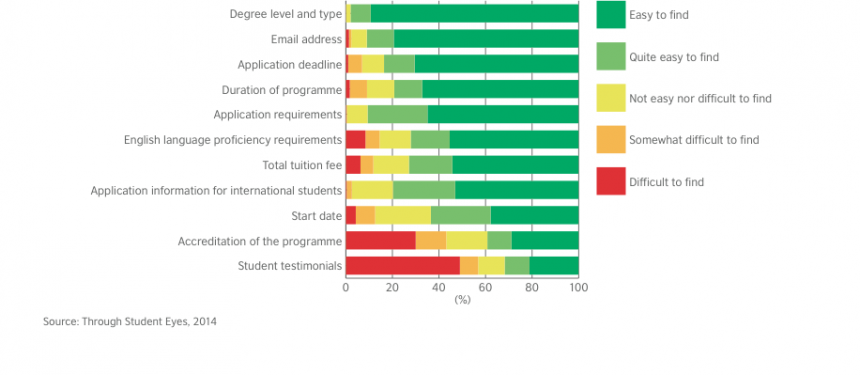A mystery shopper style study that employed a team of international students to judge response times to enquiries made to top 500 universities and assess the findability and clarity of their home pages has revealed that 21% of universities did not respond to students’ enquiries.
News and business analysis for Professionals in International Education
Have some pie!
21% of enquiries go unanswered in mystery shopper study

Carried out by StudyPortals in collaboration with the British Council and IELTS, the research scored universities on how easy it was for students to find their websites, understand the information provided for prospective international students and their speed of response to a request for more information.
While UK and Irish universities performed best overall, institutions in the Netherlands were the speediest respondents — almost 60% replied to students within less than a day of making the enquiry.
Overall, 57% of the world top 500 universities responded to enquiries within one day.
“The most interesting finding and the most unexpected finding was the amount of universities that did not reply to student enquiries,” commented Elizabeth Shepherd senior research manager, English and Exams at the British Council and an advisor on the project.
“There’s lots of learning needed about the pressures institutions are under to ensure they provide really good customer service”
“In discussing with lots of different universities themselves and practitioners in international higher education many have commented that if a student is enthusiastic enough or wants to study at a university enough they will endeavour to contact the university again.”
Each institution was evaluated on two full-degree English taught programmes one in science and humanities and another in business-related subjects.
Shepherd pointed out that some courses receive a larger volume of enquiries than others affecting response times.
“These popular universities get hundreds of thousands of requests from various places a day. There’s no way that they can even hope to reply within one day or half a day to all student enquiries especially at busy times for really over subscribed programmes.
“There’s lots of learning needed about the pressures that not just the international office but the institutions themselves are under to ensure they provide really good customer service,” she said.
Universities in Spain and China fared the worse in response duration with 60% of the institutions in Spain, and 64% of the institutions in China, not replying to the enquiries they received as part of the study.
“This could be due to the maturity of the international efforts of institutions in some countries who maybe aren’t as well practiced or don’t have the resources or the processes in place like universities in North America or the UK or Australia or New Zealand who are really well-versed at knowing how to respond to international student enquiries,” commented Shepherd.
“I think universities that are just going down the road of international aren’t as well set up.”
Universities were also marked on the level of difficulty to find and understand information on 11 data points including English language proficiency requirements, a contact email address and tuition fees.
Overall, information on the degree level and type was the easiest to find while student testimonials and programme accreditation were the most difficult.
“We wanted to see whether you could find the information and if you could understand it”
“A lot of universities use their own jargon, ‘EEA’ or ‘ECTS’ that doesn’t make sense to international students. The fact that you get 60 credits a year is not well-known to them for example,” commented Joran van Aart Director of Student Value at StudyPortals.
“We wanted to see whether you could find the information and if you could understand it.”
Other findings show that 81% of universities’ websites aren’t mobile ready and only 12% of institutions reach out to an interested student more than once.
“I think the information is something that the institutions themselves already knew,” said Shepherd. “It was confirmation of where their efforts had been most successful and in interesting ways it points institutions toward seeing what their competitors are doing that they could potentially be doing in the future. The real the benefit of this exercise will be the international benchmarking.”
According to StudyPortals, it will provide institutions involved in the study with a report on their individual performance compared with the global benchmark in order to “help them provide better services to international students” and “promote transparency in international education worldwide”.
Still looking? Find by category:



Providing quality customer service only requires a commitment. There are no acceptable excuses for poor customer service.